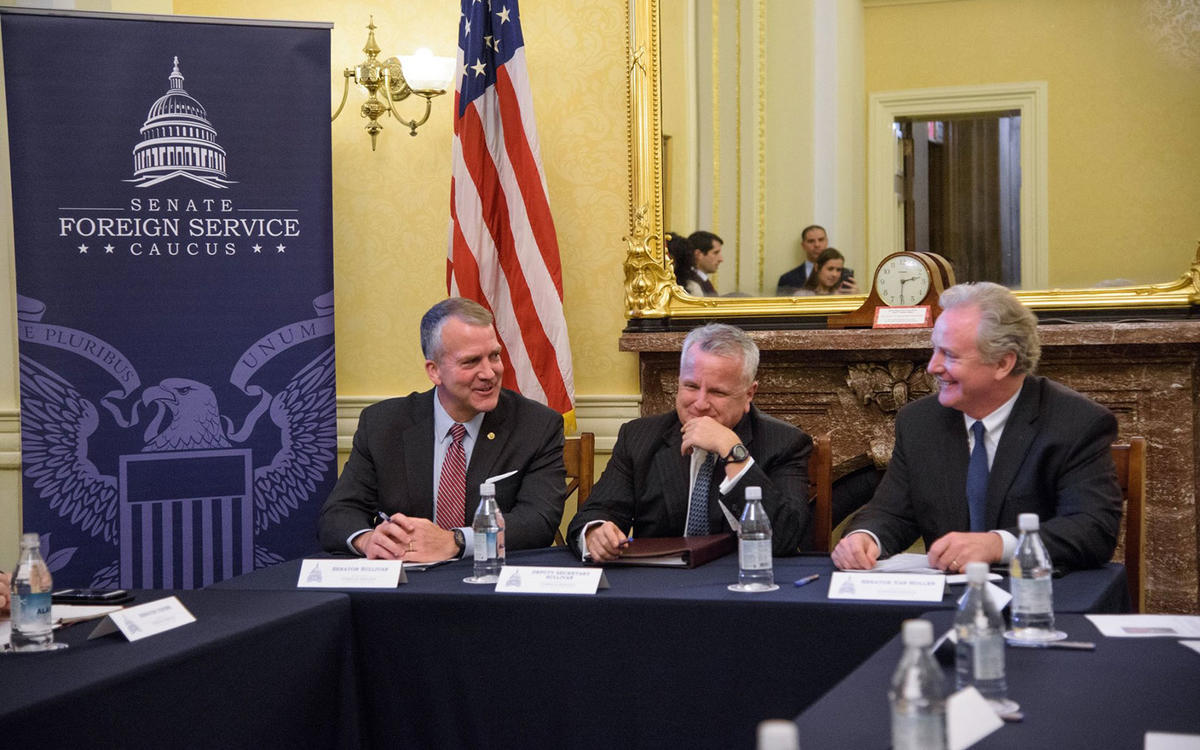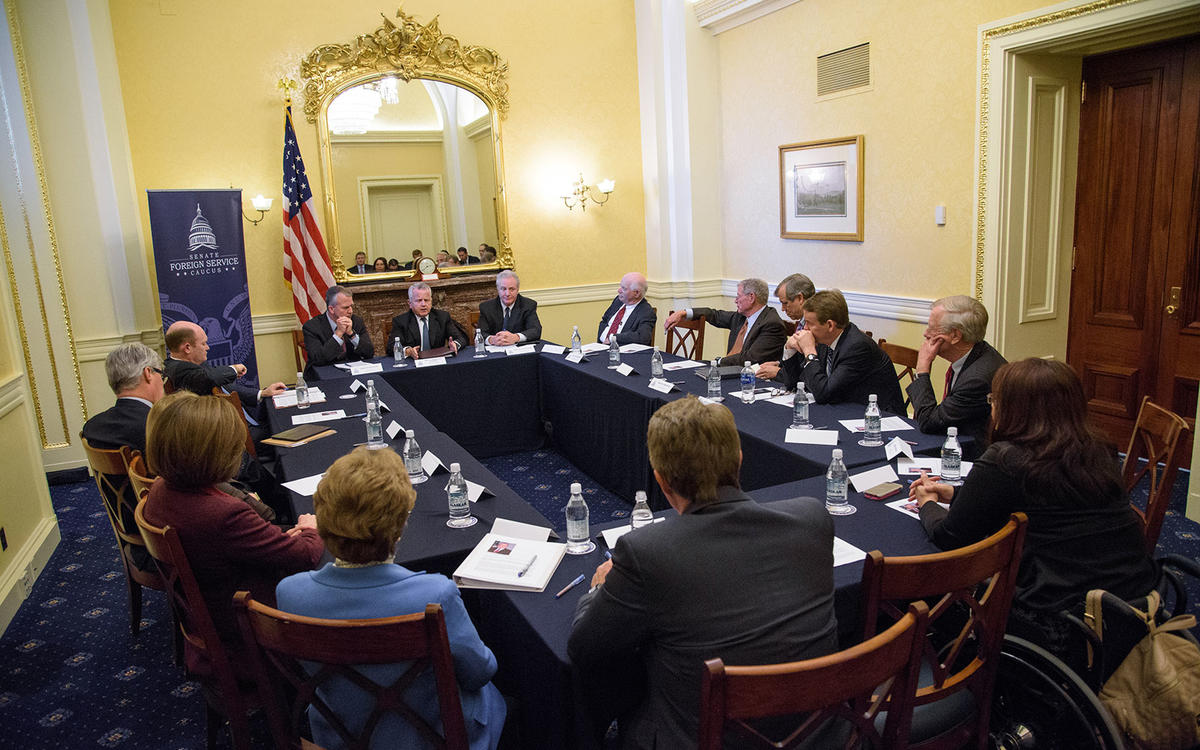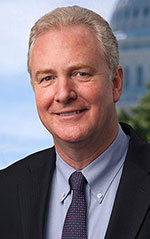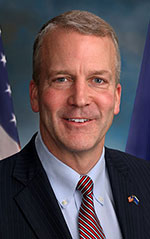Standing Up for Diplomacy
A Message from the Hill
BY SENATORS CHRIS VAN HOLLEN AND DAN SULLIVAN

Deputy Secretary of State John Sullivan is flanked by Senator Chris Van Hollen, at right, and Senator Dan Sullivan in a meeting of the Senate Foreign Service Caucus on Dec. 20, 2017.
U.S. Senate
The global challenges confronting the United States are evolving and growing. Roiling conflicts in the Middle East, Africa and Southeast Asia have led to refugee crises across borders; terrorist networks have expanded their reach into the information space; and North Korea’s rapidly developing nuclear program has tested the security of our regional alliances. Russia’s election meddling has sharpened societal divisions in the United States and Europe.
In this unpredictable environment, diplomacy—vigorous, tireless and optimistic— is an absolute imperative. Recognizing this critical need, and the need for broader discussion in the Senate, the two of us undertook a bipartisan initiative to form the Senate Foreign Service Caucus in the spring of last year.
Congressional caucuses are typically formed as a way for members with like-minded interests to come together to support a common cause or constituency and advance specific policy priorities. In the Senate, caucuses for every branch of the military—U.S. Air Force, U.S. Navy, U.S. Army and the U.S. Marine Corps—have been around for years and have formed a broad, bipartisan base of supportive senators. Noticeably, however, the Senate had not formed an equivalent caucus for the men and women of the U.S. Foreign Service.
Like the Armed Services, whose members defend this country in uniform, the Foreign Service is comprised of professionals who serve the elected leaders of our country regardless of party and who sacrifice—alongside their families— to advance American interests abroad. This mission underscores the purpose of the Senate Foreign Service Caucus and the bipartisan view that the State Department must remain at the forefront of American engagement around the world.
In the face of proposed cuts, the Senate Appropriations Committee chose instead to make key investments in American diplomacy, development and national security.
Since its founding last year, 21 senators have come together from both sides of the aisle, and all committees, in caucus meetings with Deputy Secretary of State John Sullivan and Under Secretary of State Tom Shannon, to engage in active and open dialogue, focusing on the critical role the Foreign Service plays in our national security and foreign policy. As we progress into 2018, we remain committed to continuing that engagement with the State Department.
In these discussions we all acknowledge that the public debate about America’s role in the world shifts from administration to administration in ways that can have a significant impact on the work of the Foreign Service. While Republicans and Democrats may disagree on some of the contours of our foreign policy, there are moments of clarity when big issues—like fully funding the State Department—come into focus and bipartisan resolve turns to action to ensure America maintains its leadership in the world.
Given our unique backgrounds in foreign policy, we both feel strongly about the crucial role our State Department must continue to play. We have listened closely as our nation’s military leaders emphasized the importance of the State Department and its diplomatic mission to the Defense Department. Secretary of Defense James Mattis summarized it best in his now famous admonition to legislators: “If you don’t fund the State Department fully, then I need to buy more ammunition ultimately.”
And last September the Senate Appropriations Committee voted unanimously in favor of a bill appropriating more than $51 billion for the State Department and the U.S. Agency for International Development. In the face of proposed cuts that would amount to one-third of the budget for these critical agencies, the Senate Appropriations Committee chose instead to make key investments in American diplomacy, development and national security.
In the report accompanying that legislation, the senators stated: “Defense alone does not provide for American strength and resolve abroad. Battlefield technology and firepower cannot replace diplomacy and development.”

On Dec. 20, 2017, the Senate Foreign Service Caucus held a roundtable discussion with Deputy Secretary of State John Sullivan on the international affairs budget.
U.S. Senate
That is why the Senate also bolstered assistance to our trans-Atlantic partners, particularly those on Russia’s front line. We provided comprehensive funding for global health programs that help prevent the spread of disease. We supported refugees, disaster assistance and efforts to counter violent extremism. Our message could not have been clearer: we believe a strong State Department is critical for the security and prosperity of our nation.
Although our politics at home can sometimes seem divided, in its constitutional role in U.S. international relations, the Senate has been steadfast as one of the strongest champions for democracy and human rights abroad. As an institution, we have historically held the view that promoting human rights, democracy and the rule of law is not only consistent with universal values but also serves our long-term security and economic interests.
As our colleague Senator John McCain (R-Ariz.) said last May: “Our values are our strength and greatest treasure. We are distinguished from other countries because we are not made from a land or tribe or particular race or creed, but from an ideal that liberty is the inalienable right of mankind and in accord with nature and nature’s Creator.”
We commend our Foreign Service for not only promoting these values and ideals, but for supporting others in achieving them. Our diplomats are the finest in the world. We in the Senate are tremendously grateful for your service and your sacrifice. You have our enduring support in the pursuit of our common goal: a better America in a better world.




